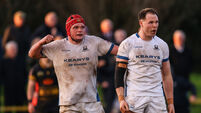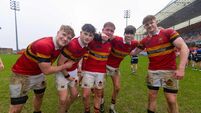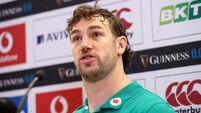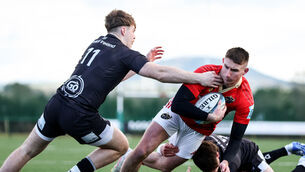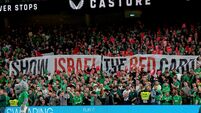Ready to take on the world
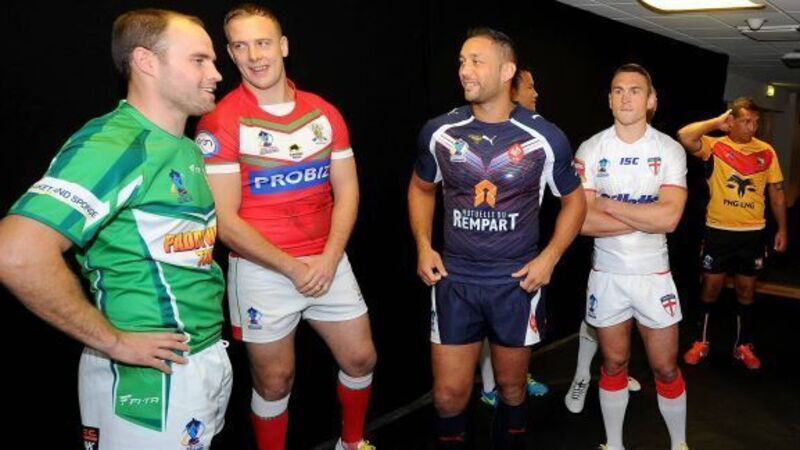
Having lost by two points to Tonga at Penrith Stadium, the Irish rugby league Wolfhounds took Samoa for 34 points at Parramatta Stadium in Sydney before succumbing to Fiji in the World Cup quarters.
No-one took much notice here of a side stocked with first and second-generation Irish from Britain and Oz but they exited the tournament heralded widely as one of its most inspiring stories.
“It was a really successful World Cup but the issue for us in Rugby League Ireland (RLI) was we had very little impact with the public here,” says RLI general manager, Gordon Matthews.
“It just didn’t register.”
That cloak of invisibility still exists. Today, an expected crowd of 40,000-plus will converge on the Millennium Stadium in Cardiff to take in the double-header opener to the latest global gathering, as Australia meet England and Wales take on Italy.
Ireland make their bow on Monday with a tough but winnable appointment against Fiji in Rochdale before huge dates against England in Huddersfield and favourites Australia who visit Thomond on November 9.
Win one of those matches and the quarter-finals should beckon again and, though Mark Aston’s men will start as underdogs in the obligatory group of death, they possess enough quality to make that achievable.
The bulk of the squad earns a living in England’s Super League, more again in the second tier Championship while four have been sourced from Australia’s star-studded National Rugby League (NRL).
Players such as Pat Richards and Liam Finn are recognised stars and could well have lined out for Australia and England in 2008 but chose to play for the land of their forebearers under a grandparent rule that will be familiar to those in the soccer fraternity. Only one, Matty Hadden from Belfast, is Irish born and bred, however, though the goal for this tournament was to have four homegrown players — and seven when the tournament decamps Down Under again in 2017.
That’s not to say that progress hasn’t been made.
Three other young Ulster players — John James Baird, Kenny Calladine and Ruairi Lynch — are listed alongside Hadden on the books of new Championship 1 side Oxford while Laois native Tim Bergin plays with Gloucester All-Golds.
Numbers domestically are thin on the ground. Less than a thousand people play the game on the island with 15 clubs competing in a summer-based league and a State of Origin-type series held every July between Leinster, Munster and Ulster.
Representative sides include Aston’s senior outfit, an amateur ’A’ squad and a student version with the vast majority of home-based enthusiasts being union players keen to maintain skill levels during their off-season.
Dependence on others has been a familiar theme.
England’s Rugby Football League (RFL) provided the readies to employ RLI full-time staff back in 2009 while official recognition has since been secured from the Rugby League International Federation, the Irish Sports Council and Sport Northern Ireland.
The hope is that RLI will succeed in drawing down funding from the global body which expects to make over €3m profit from the World Cup but Matthews admits they are “unsure of revenue streams” post-World Cup.
All of which makes the meeting with the Kangaroos in Limerick a fortnight from now so important, even if the impact of a game where they hope to attract 10-15,000 people will be diluted by a lack of live television coverage.
“It gives us a great chance to get a bit of a profile, to let people in Ireland see how good the game can be, how good the guys who are qualified for Ireland are and see some of the best rugby league players in the world at what should be a great event.”
Joe Schmidt’s Ireland meet Samoa at the Aviva Stadium that same day and Matthews, who played union with Old Wesley before being drawn to league when he moved to Portlaoise, is well used to such crossover. His son served as the bridge between the two codes when he was called to represent the Irish students in Australia. Dad went along too and in no time at all he found himself coaching and then governing too.
He still has the grá for union but launches a staunch defence of league when it is suggested Irish punters might find hard to embrace because it can seem a tad repetitive at times. “A bad game of rugby league can be like that, but I challenge anyone to watch NRL or Super Rugby or State of Origin and there is no better rugby and I include international rugby union in that. State of Origin is incredible. It’s those same players who are coming to Limerick.”






